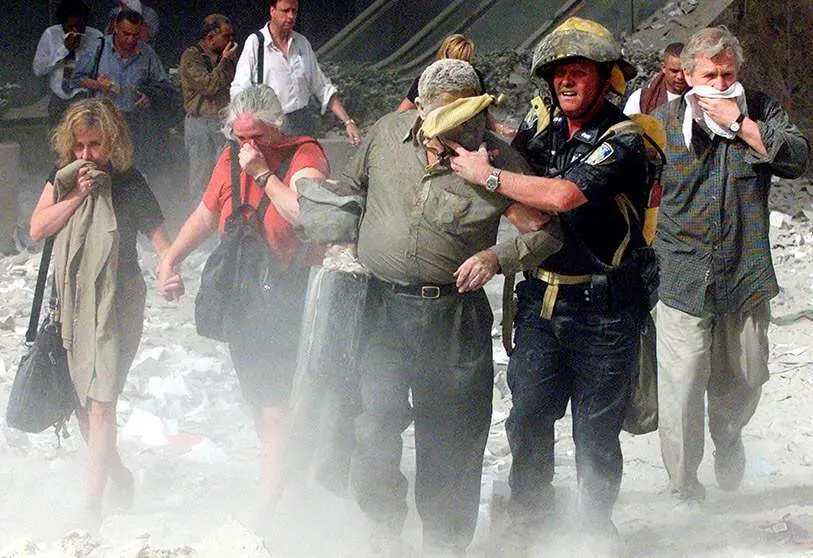The anniversary of fear

The terrible images of two aeroplanes crashing into two huge buildings full of people who, at that time of day, were beginning their working day, or even some restless tourists, climbing to the top to observe the impressive views from the Twin Towers, still make my skin crawl.
On that fateful morning of 11 September 2001, more than just thousands of innocent human beings died, with them agonised any possibility of peace in the world.
Two decades have passed and we are not only twenty years older, but that watershed event accelerated a series of events that have ended up shifting the counterweights of global power and the geopolitical and geo-economic balance.
Since the fall of the Berlin Wall in 1989 and the subsequent dismantling of the communist Soviet bloc, with the consequent collapse of the Cold War, the United States had practically emerged victorious and with it its formula of capitalism and democracy, remaining alone at the forefront and imposing its unipolar vision.
Although by the 1980s the US State Department had been producing reports about the imminent competition that China would represent for US hegemony.. The USSR was no longer the focal point - the Chinese were.
At the beginning of the 21st century, the United States, as an economic and military power, had arrived with concerns about its frictions with Iraq, Libya, Iran and North Korea which, at the time, occupied much of its intelligence work.
After the surprise attacks of 11 September 2001 - another chilling Pearl Harbor - this time in the heart of lower Manhattan and without a global war, in the following years China's rise as a power accelerated and Russia returned to the international arena as a strong geopolitical actor.
While President George Walker Bush was planning an invasion of Afghanistan with the backing of his NATO allies after invoking Article 5, reportedly to catch Osama bin Laden and destroy the Al-Qaeda network, both blamed for the attacks, China was finally celebrating its inclusion in the World Trade Organisation (WTO) after years of trying to join.
If in 2001 it had a share in world trade of less than 15 per cent, twenty years later it controls almost 50 per cent of global trade. China and Russia are the two countries that have benefited most from the watershed opened up by 9/11.
In these years, China's hegemony has grown in virtually every area and is accelerating its global influence with its New Silk Road (One Road, One Belt).
In all the years that the White House has spent time, money and effort maintaining its troops in Afghanistan and waging its invasions of Iraq, Libya and Syria, China's strategy has been to follow five-year plans of heavy investment to make the country more technologically advanced and competitive.
It seems to me that there are many loose ends to this tragic story. What was really going on in Afghanistan to remain in such a geographically complicated place for so long? Moreover, an old acquaintance of US forces and the CIA itself had given arms and support to the Afghans against Soviet forces in the war that began in 1979 and ended in 1989 with the Soviet Army returning home.
Why the US in Afghanistan? Osama bin Laden, as noted by then President Barack Obama, was killed by special operations forces in a house in Pakistan in May 2011... yet they remained in Afghanistan for ten more years. 9/11 has been a pretext for 2.2 trillion dollars spent by the US treasury, as when Bush said Hussein had an arsenal of chemical and biological weapons and they never found anything.
Bush, days before 9/11, was called by a young Vladimir Putin who, as President of Russia, had vital information... he told him that his secret services were warning of an imminent attack on the United States and that Russia had nothing to do with it; he told him that he was very concerned about the assassination of Ahmad Shah Masud, one of the strongest anti-Taliban leaders in the region, killed in a fake interview that ended in a self-assassassination attempt. Today, his son, Ahmad Masud, is fighting the Taliban who, in their return, want to control Panjshir.
Bush would soon thank him for the gesture by inviting Putin to the United States. They met several times during the years of his administration; the White House had reopened the door to Russia as a relevant political actor and this fact was taken advantage of by a shrewd Putin.
Twenty years have passed and now we are immersed in another bubble of fear with a virus that is claiming millions of lives, perhaps this pandemic is not entirely exempt from these power games. Right now, China is still the biggest beneficiary of the pandemic and, together with Russia, they are taking advantage of the vaccines to extend their areas of influence. The world is different... the fear is the same.

